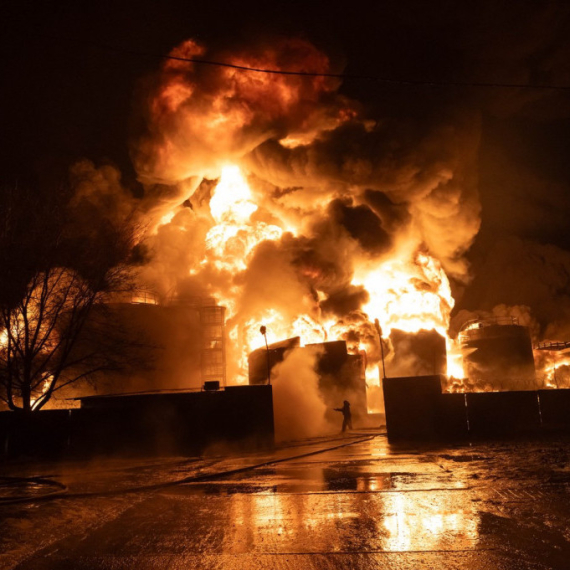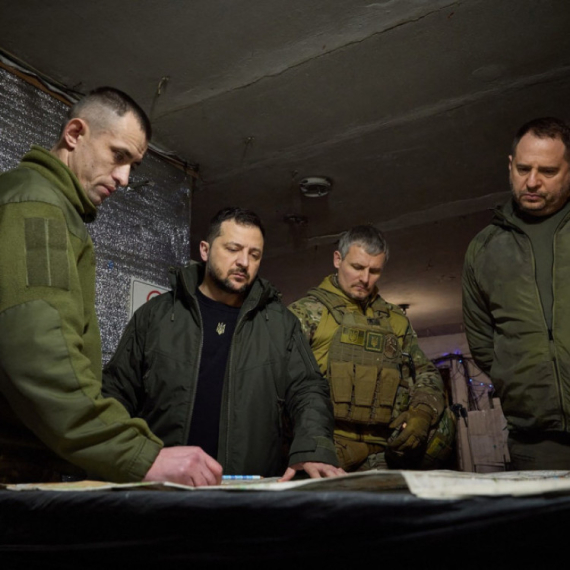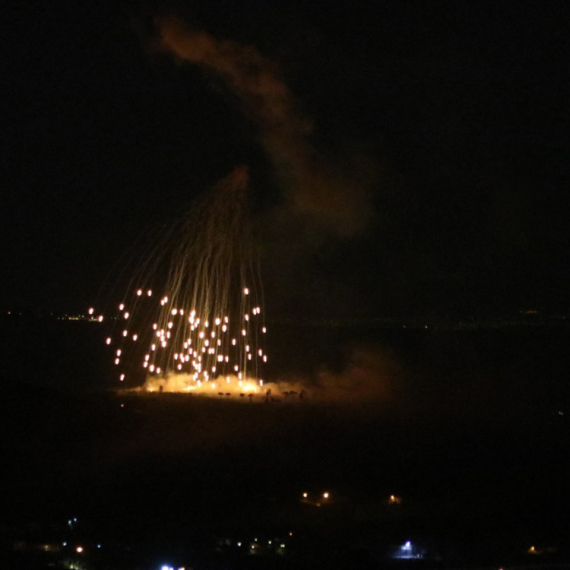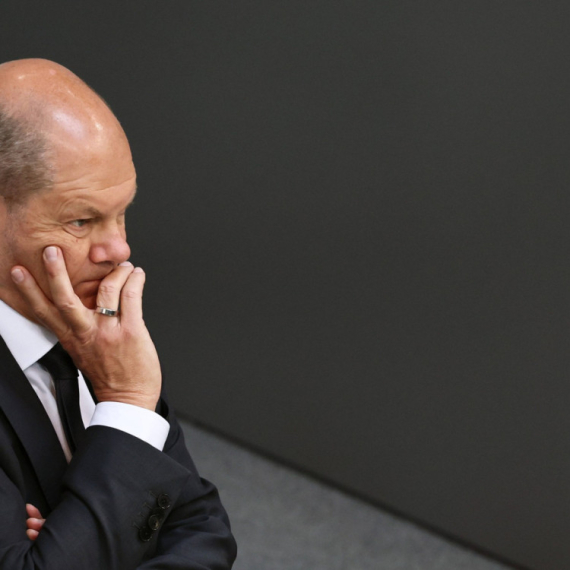U.S. arms delivery "poses no military threat"
Lt. Gen. Zdravko Ponoš says the U.S.'s decision to ship weapons to Kosovo doesn't pose a military threat to Serbia.
Tuesday, 25.03.2008.
12:44

Lt. Gen. Zdravko Ponos says the U.S.'s decision to ship weapons to Kosovo doesn't pose a military threat to Serbia. The chief of the Serbian Army general staff also said that it was however “politically an incorrect, ill-timed and damaging move.” U.S. arms delivery "poses no military threat" “The decision of U.S. President George Bush to approve the shipment of military equipment to an independent Kosovo merits attention, and it is not a step in the right direction. It was the wrong thing to do,” Ponos told the Tanjug news agency. He said that “Kosovo, at this moment in time, certainly does not need added weapons, as much as it needs tractors, seeds, schools, nurseries and jobs…” “I think that that kind of help would be a lot more suitable for the people of Kosovo right now, given that the conflict is behind us, and we’re in a post-conflict era,” Ponos explained, adding that he did not understand what good could come out of giving weapons to the Kosovo government. “I don’t believe that it changes the military balance in the region, or that it represents a military threat to Serbia,” the lieutenant-general said. “It is an ill-timed gesture politically, and a damaging gesture on the part of the outgoing American administration, or, should I say, part of the administration, above all, maybe some people who are still finishing off the job started by the Clinton administration,” he suggested. Ponos said that the decision would not help Serbian-American relations, particularly not military cooperation between the two countries. The lieutenant-general said that “such a gesture is compensation for the slower than expected dynamics of the recognition of Kosovo’s unilateral independence declaration.” “Maybe it is compensation to calm the extremists in Kosovo down, but it is short-term and will not have any good results in the long run,” Ponos predicted. He added that the security situation in the Ground Safety Zone had not been affected, but that it was very sensitive. The Serbian military, the lieutenant-general said, would monitor the situation carefully, and was ready to take all measures depending on the situation on the ground, and to quickly react together with the rest of Serbia’s security forces. “Right now, there is no need for added support, one reason we are not doing this is because we do not want our own activities to draw attention away from the problems in Kosovo that UNMIK and KFOR need to deal with,” Ponos said, adding that “the level of trust which he have built up recently allows us to behave in this way." “Cooperation between the Serbian military and KFOR is, firstly, tied to relations along the administrative line, and in that sense, there have been no problems in our cooperation,” he said, stressing that cooperation “is still going very well, and is in accordance with the internationally undertaken obligations on both sides.” Ponos said that “during the events that ensued after the unilateral declaration of Kosovo independence, he was in constant contact with KFOR commander Xavier de Marnhac.” “We exchanged information. On several occasions we exchanged advice on what would be wise to do in this situation, and that was good. And this kind of communication is the result of the trust and respect established with the Serbian military that was gained by respecting internationally signed agreements and the obligations that came with them,” the lieutenant-general explained. He said that “with the events of March 17, I told the KFOR command that events in northern Kosovska Mitrovica had shown that they had used bad timing and poor methodology for the operation, and that there had been an excessive use of force.” “At the same time, the aggressive response of our citizens to KFOR and UNMIK officials is not something that does us any favors, because, at this moment in time, the Kosovo Serbs do not have anyone other than the international forces who developed the UN mandate which we recognize and accept, to protect them,” Ponos underlined. Zdravko Ponos (FoNet, archive)
U.S. arms delivery "poses no military threat"
“The decision of U.S. President George Bush to approve the shipment of military equipment to an independent Kosovo merits attention, and it is not a step in the right direction. It was the wrong thing to do,” Ponoš told the Tanjug news agency.He said that “Kosovo, at this moment in time, certainly does not need added weapons, as much as it needs tractors, seeds, schools, nurseries and jobs…”
“I think that that kind of help would be a lot more suitable for the people of Kosovo right now, given that the conflict is behind us, and we’re in a post-conflict era,” Ponoš explained, adding that he did not understand what good could come out of giving weapons to the Kosovo government.
“I don’t believe that it changes the military balance in the region, or that it represents a military threat to Serbia,” the lieutenant-general said.
“It is an ill-timed gesture politically, and a damaging gesture on the part of the outgoing American administration, or, should I say, part of the administration, above all, maybe some people who are still finishing off the job started by the Clinton administration,” he suggested.
Ponoš said that the decision would not help Serbian-American relations, particularly not military cooperation between the two countries.
The lieutenant-general said that “such a gesture is compensation for the slower than expected dynamics of the recognition of Kosovo’s unilateral independence declaration.”
“Maybe it is compensation to calm the extremists in Kosovo down, but it is short-term and will not have any good results in the long run,” Ponoš predicted.
He added that the security situation in the Ground Safety Zone had not been affected, but that it was very sensitive.
The Serbian military, the lieutenant-general said, would monitor the situation carefully, and was ready to take all measures depending on the situation on the ground, and to quickly react together with the rest of Serbia’s security forces.
“Right now, there is no need for added support, one reason we are not doing this is because we do not want our own activities to draw attention away from the problems in Kosovo that UNMIK and KFOR need to deal with,” Ponoš said, adding that “the level of trust which he have built up recently allows us to behave in this way."
“Cooperation between the Serbian military and KFOR is, firstly, tied to relations along the administrative line, and in that sense, there have been no problems in our cooperation,” he said, stressing that cooperation “is still going very well, and is in accordance with the internationally undertaken obligations on both sides.”
Ponoš said that “during the events that ensued after the unilateral declaration of Kosovo independence, he was in constant contact with KFOR commander Xavier de Marnhac.”
“We exchanged information. On several occasions we exchanged advice on what would be wise to do in this situation, and that was good. And this kind of communication is the result of the trust and respect established with the Serbian military that was gained by respecting internationally signed agreements and the obligations that came with them,” the lieutenant-general explained.
He said that “with the events of March 17, I told the KFOR command that events in northern Kosovska Mitrovica had shown that they had used bad timing and poor methodology for the operation, and that there had been an excessive use of force.”
“At the same time, the aggressive response of our citizens to KFOR and UNMIK officials is not something that does us any favors, because, at this moment in time, the Kosovo Serbs do not have anyone other than the international forces who developed the UN mandate which we recognize and accept, to protect them,” Ponoš underlined.




























































Komentari 13
Pogledaj komentare